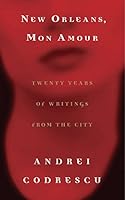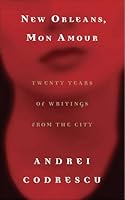- Welcome to FictionDB, Guest
- | My Account
- | Help

New Orleans, Mon Amour — Andrei Codrescu
buy the book from amazon
Paperback editions:
Hardcover editions:
eBook editions:
Audio editions:
Large Print editions:
Browse Similar Books at Amazon
Literature & Fiction->Literary
Literature & Fiction->Short Stories & Anthologies->Short Stories
Kindle Store->Kindle eBooks->Travel->United States->Regions->South
Kindle eBooks->Travel->United States->States->Louisiana->New Orleans
Kindle Store->Kindle eBooks->Literature & Fiction->Literary Fiction->Short Stories
Kindle Store->Kindle eBooks->Literature & Fiction->Short Stories->Single Authors
Kindle Store->Kindle eBooks->Literature & Fiction->United States->Short Stories
Description
NPR commentator Andrei Codrescu has long written about the unique city he calls home. How apt that a refugee born in Transylvania found his place where vampires roam the streets and voodoo queens live around the corner; where cemeteries are the most popular picnic spots; the ghosts of poets, prostitutes, and pirates are palpable; and in the French Quarter, no one ever sleeps.
Codrescu's essays have been called “satirical gems,” “subversive,” “funny,” “gonzo,” and “wittily poignant” -- here is a writer who perfectly mirrors the wild, voluptuous character of New Orleans itself. This retrospective follows him from newcomer to near native: first seduced by the lush banana trees in his backyard and the sensual aroma of coffee at the café down the block, Codrescu soon becomes a Window Gang regular at the infamous bar Molly's on Decatur; does a stint as King of Krewe de Vieux Carré at Mardi Gras; befriends artists, musicians, and eccentrics; and exposes the city's underbelly of corruption, warning presciently about the lack of planning for floods in a city high on its own insouciance. Alas, as we all now know, Paradise is lost, but here Codrescu also writes about how the city's heart still beats even after 2005's devastating hurricane.
New Orleans, Mon Amour is a portrait of an incomparable place, from a writer who “manages to be brilliant and insightful, tough and seductive about American culture” (The New York Times Book Review).
“Finely honed portraits of a fabled city and its equally fabled inhabitants. The author, who has called the Big Easy home for two decades, shows how, like some gigantic bohemian magnet, New Orleans attracts some of the world's most talented, self-indulgent freaks. Codrescu finds himself quite at home there. He expertly weaves pages of New Orleans history through his stories of personal discovery and debauchery. . . . Readers can't help coming away from reading it without an abiding hope in the ability of ordinary people, under the worst circumstances, rising to whatever challenges they face.” -- Publishers Weekly
CERTAIN CONTENT THAT APPEARS ON THIS PAGE COMES FROM AMAZON. THIS CONTENT IS PROVIDED ‘AS IS’ AND IS SUBJECT TO CHANGE OR REMOVAL AT ANY TIME.


 Amazon UK
Amazon UK